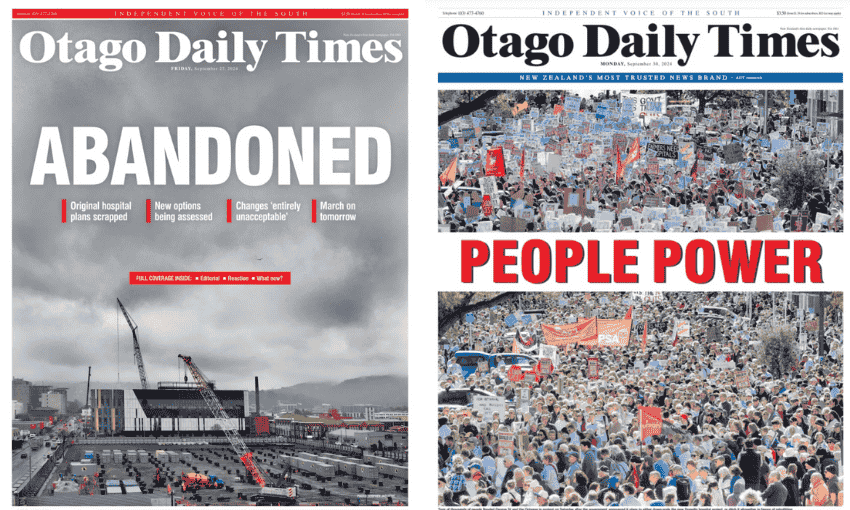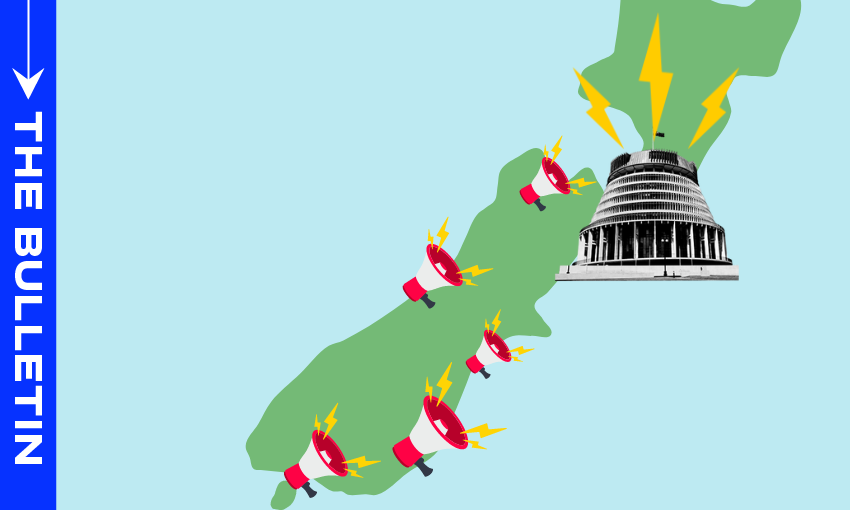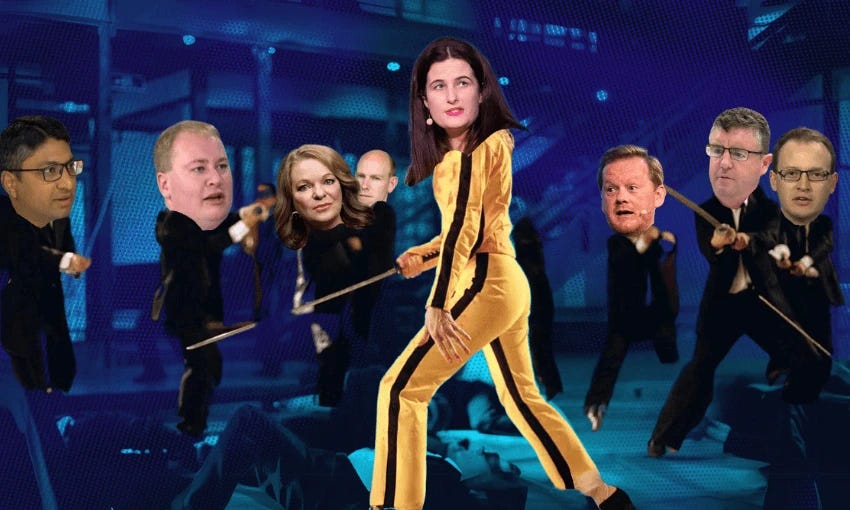Hospital call adds insult to injury for 'forgotten' South
It's been a long-standing catch-cry, but the 35,000-strong march in Dunedin suggests the South is done with being 'forgotten' and will remember.
Mōrena, and welcome to The Bulletin for Tuesday, October 1.
In today’s edition: Government issues plan for next quarter; no new gas fields are likely to be discovered and developed in the next 10 years; what the council could actually do for Wellington cafes and bars; but first, has the government underestimated the force of the South?
Pinch and punch for the first of the month.
On that note and in a clunky segue, let’s look at the government’s pinched finances, the fightback regarding the recent announcement about the future of the Dunedin Hospital project and other reasons the people of the South Island might be feeling like they have a legitimate beef with decision-makers up North.
The ‘forgotten’ south
“[Insert party or current government] has forgotten about [insert region]” is a recurrent political diss track. Labour leader Chris Hipkins accused the current-day government of forgetting about the South Island in July. Act leader David Seymour said the same of the then Labour government in December 2022, pointing out that of the “top 10” cabinet ministers, only two were from the South Island. Matt Doocey is the only minister inside this government’s current cabinet from the South Island.
Cantabrians have maintained a steady“forgotten about” drumbeat since the earthquake in 2011. Before the news about Dunedin hospital, the government's National Land Transport plan was the focus of cries of unfair resource allocation in the South Island.

Orchestrated effort brings 35,000 out to march
Following the announcement last week that the government may downgrade Dunedin’s proposed new hospital to keep it within its current funding appropriation, all forces rallied to make sure the voice of Dunedin was heard. The ODT has been doing what a local print masthead does best at times like this, running two incredibly strong front pages.
As The Spinoff’s Tara Ward notes in this brilliant on-the-ground report from Sunday’s protests, the Otago Regional Council put on free buses to make travel into the city centre easy. The Dunedin city council is at the forefront of the “They save, we pay” campaign, leading the way with a protest song sung to the tune of the old Carisbrook anthem, “Welcome to the house of pain”. An estimated 35,000 people turned out to march on Sunday, making it clear they believe the government has broken an election promise. By comparison, one of the biggest protest marches in this country’s history saw an estimated 40,000 people marching in Auckland to protest the government’s proposal to mine on conservation land in 2010.
What now?
RNZ has a great explainer and timeline on the Dunedin hospital rebuild project to date. Both health minister Dr Shane Reti and Prime Minister Christopher Luxon have said they understand the frustration and remain committed to delivering “a good hospital for the people of the South”. Luxon reiterated yesterday that it must remain within budget, with a “blow out” figure of $3b cited. The project is to be delivered within its current appropriated budget ($1.88b), and urgent advice is being sought to ensure that happens.
Dunedin mayor Jules Radich told RNZ the $3b figure was an exaggeration and that “They've included in that things like carparking and pathology and other services that were never in this scope, and were taken out of the scope two years ago.” He called the report commissioned by the government on costs “smokescreen” and said the fightback is just beginning.
While Dunedin is a Labour stronghold, the area the hospital serves as a tertiary healthcare provider extends beyond Dunedin’s red borders and spills into the huge Southland electorate, which, amid electoral boundary reshuffles, has remained a National stronghold. To the north, National’s Miles Anderson holds Waitaki. Clutha District mayor Bryan Cadogan is joining Radich in the pushback on the figures being cited, telling RNZ’s Checkpoint last night that he wants the government to “show us the figures”
West Coast, Timaru, Picton and Invercargill also have beef
In addition to protests in Dunedin, West Coast residents took to the streets in Westport on Saturday to protest against the region’s “dire” lack of health care services.
In Timaru, workers at the Alliance Group's meatworks learned about a proposal to close the Smithfield processing plant, affecting about 600 staff. Federated Farmers is blaming land use changes. Minister for rural communities Mark Patterson said it was "pretty foreboding" for Timaru and the surrounding districts. “It's really concerning; it's a wake-up call. We as a government have got to take this seriously,” he said.
No mention was made of a plan for the Interislander ferry in the government’s plan for the fourth quarter released yesterday. After the iRex plan was cancelled in December, the decision was described as a shock to people in Picton.
Topping off a batch of bad news yesterday was Air New Zealand’s announcement that it would cease direct flights between Wellington and Invercargill in January. Travellers will now need to stop in Christchurch, adding 35 minutes to the trip, casting the productivity gains being cited around removing blanket speed limits on our roads in a slightly different light.
“Compared to other degrees I've done, Yoobee was very hands-on. That's why I really enjoyed the course… because you got to see what you built.”
Tech is an amazing career for women, but what's the best way to break in? In the latest in our series talking to people who’ve retrained at Yoobee College of Creative Innovation, Karen Jin tells us how she made the switch to tech with the help of Yoobee’s expert tutors and the support offered by the Yoobee & Datacom Women in Tech Scholarship. Read her story here (sponsored).
Government releases plans for Q4
Stuff’s Glenn McConnell has a useful rundown on the government’s plans for the next three months, or as we now say, quarter. There are 43 things on the to-do list for the last three months of the year, and the focus is infrastructure. Writing in the NZ Herald this morning, Thomas Coughlan notes (paywalled) that “the most controversial of the 43 promises will be a commitment to finally pass the fast-track bill, which has become an albatross around the government’s neck, thanks in part to fears it’ll be used by vested interests to gorge themselves on natural resources without the public having much say.” Coughlan also notes that the government is clearly frontloading hard decisions into its first year but “there is a risk it overcooks the fire and brimstone and embeds itself in the public imagination as a pack of chain-smoking hatchet men.”
‘You’re a f***ing sellout’ — protestors get heated about oil and gas reversal
Resources minister Shane Jones copped it from a small group of protestors yesterday afternoon who say, “With the coalition of chaos government pushing through laws to reopen new oil and gas exploration in Aotearoa, it is time to say no to their climate denial ... and to new fossil fuels.” Jones, ever the seasoned pro at a retort, served it right back, as the NZ Herald reports. “You’re being extreme,” Jones said. “You’re being hysterical. Enjoy your democratic rights. You’re being hyperbolic, which you’re entitled to.”
A report from RNZ’s Eloise Gibson yesterday revealed modelling from the Ministry for Business, Innovation and Employment (MBIE) says no new gas fields are likely to be discovered and developed in the next 10 years.
As Gibson notes, it “makes the climate impacts of the law change smaller, but also shrinks any expected impact on the energy market.”
Submissions on the government's bill to reopen oil and gas exploration close tonight (October 1) at 11.59pm after only being open for four days, a move some might describe as cynical. Jones replied to the protestors on that point, saying the Labour government did not allow any opportunity for public submissions on the oil and gas exploration ban. If Jones is referring to the Crown Minerals (Petroleum) Amendment Bill, which banned future offshore oil and gas exploration and passed while NZ First was in coalition with Labour, the submission period was truncated but did exist. The bill was introduced to parliament on September 24, 2018. The period to make submissions and receive official advice, of which there were 2,317 examples, according to Hansard, ran until October 11, 2018.
Support our expanding mahi in the capital
If you value our coverage of all things Wellington, from our maps of bike networks, to local politics, to untold history, consider making a donation or becoming a member today.
Return-to-office won’t save Wellington hospo
As The Spinoff’s Wellington editor, Joel MacManus, writes, “The largest employer in Wellington, the New Zealand government, wants its employees to stop working from home. Public service minister Nicola Willis cited productivity concerns with working from home, especially for younger professionals who miss out on valuable face-to-face time.”
In his latest Windbag column, Joel posits that “you can’t force someone to spend money in a city any more than you can force someone to live there.” So what could the council actually do to boost cafes and bars during an economic downturn?
Joel has a few ideas.
To get Joel’s Windbag column a day before anyone else does and a wrap of all our Wellington coverage, sign up to Windbag, our fortnightly Wellington newsletter.
Click and Collect
Unredacted legal advice mistakenly provided to Newsroom reveals Crown Law’s warnings to ministers about proceeding with foreshore and seabed changes
Britain’s last coal-fired power plant shuts down in line with the UK government’s policy to phase out coal power which was first signalled almost a decade ago.
After entitlement-gate and a glow-up, prime minister Christopher Luxon has moved into Premier House and sold his Wellington apartment.
Why former prime minister Sir John Key thinks Donald Trump will, and should, win the election in November
Hayden Donnell searches for an economist to back Nicola Willis’s CGT stance. Madeleine Holden on why we should stop saying “problematic”. Rupert O'Brien argues the Treaty Principles Bill is a calculated move by the Act Party. Fran Barclay reviews New World’s $10 lunch deal. We round up what to watch on Netflix NZ, Neon and more this week.
That’s it for this morning, thanks for reading. Nice to be back, Stewart should return tomorrow.
Want to get in touch? Join the conversation in the Substack comments section or via email at thebulletin@thespinoff.co.nz if you have any feedback on today’s top stories (or anything else in the news).
If you liked what you read today, share The Bulletin with friends, family and colleagues.















You forgot Nelson, and the problems with the government underfunding our hospital rebuild. We too, are South-Islanders, who feel left out.
Perhaps the 3-headed-Taniwha should get on with alternative power for the Te ika-a-maui such as solar & wind, in case Te Waipounamu carries out a long-standing threat to cut the cable sending electricity north? (joking-not-joking)